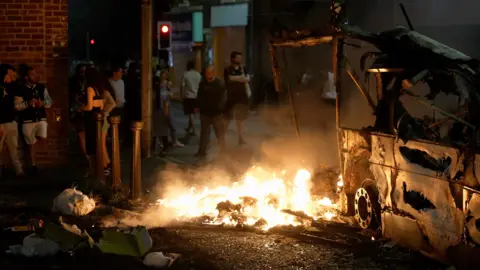'We are glossing over what happened in Harehills'
 BBC
BBCA year after disorder in a Leeds suburb saw a double-decker bus torched and a police car flipped, a councillor who helped quell the unrest has called for "real structural change" to prevent a repeat.
Chaos erupted in Harehills on 18 July 2024 after police assisted social workers taking four children into emergency foster care.
After people reacted angrily to the children being taken away, a police car was flipped over before hundreds took to the streets - forcing officers to retreat.
Gipton and Harehills councillor Mothin Ali said "structural problems" led to the violent disorder.
"We are in communities that are deprived, that are struggling with poverty, that are struggling with lack of opportunities", he told the BBC.
"We need to get to the bottom of it; there are communities coming in new to England, Harehills has always been a stepping stone, but they are not being given the support to integrate into society.
"If we are not integrating people who are struggling or marginalised into society then we are not giving people adequate opportunities.
"There is going to be reoccurrence of these problems".

On Foundry Approach, where the bus was torched just feet away from shops and tightly packed terraced homes, physical scars of the disorder remain.
The fire-damaged pavement and road is yet to be re-tarmacked, while Miller Owolo Kadiri is still waiting for the signage above his off-licence to be replaced.
Ali said he had been trying to source money "to hide the scars of what happened", but had so far been unsuccessful.
Mr Kadiri said "by the grace of God" the flames did not spread inside his business of 13 years, but the damage left other scars for the 54-year-old who told of his "shock and depression" about what happened in the immediate aftermath.
"I was really traumatised for two months before I could get myself back," he said.
 SteveJones/BBC
SteveJones/BBCTwelve months on, the BBC also revisited Saad Siddique, who owns a phone repair shop on Harehills Lane.
The 33-year-old, who still lives locally with his family, said he too was regularly reminded of what happened.
The bins set alight outside his shop had yet to be replaced, he said.
"Since that point I have to deliver mostly, people don't come into my shop anymore. They are scared.
"I want my Harehills back in a normal position it used to be two years ago."
Another shop owner, who asked to remain anonymous, said business was getting "harder and harder because of the reputation".
John White, who runs a domestic appliance repairs business further down the high street, previously criticised a lack of community cohesion in the area, thought to be one of the most diverse in Leeds.
A year on, he said little had changed.
"This could be a really good place if everybody got on together," said the 61-year-old.
 Steve Jones/BBC
Steve Jones/BBCDaniel Balaz, a community director of Connecting Roma, an organisation which supports Yorkshire's Roma community, has organised an evening of "dialogue, healing and collective repair".
"It is confusion that we are dealing with here", he said.
"I think very much the key is bringing the right information, sharing the code of conduct of police, social services, processes, legislations, rights and laws that professionals are using to be able to enter homes and engage families.
"We do not agree with rioting or displaying violence, what we want is really to empower the community and make them feel safe.
"We want to find out what the community actually feels a year on, we can start building these relationships and building bridges."
 BBC / Elizabeth Baines
BBC / Elizabeth BainesWest Yorkshire Police said 23 people had now been convicted and sentenced to more than 39 years in prison in total for their roles in the disorder.
More cases were currently in the court system, a force spokesperson added, while "substantial work" had been carried out "to help communities recover".
Last August, West Yorkshire Mayor Tracy Brabin said she would ask West Yorkshire Police Chief Constable John Robins to share his "reflections and learning" about the disorder.
Ali believes the discussions should be more open.
"They did an investigation and it felt like it was behind closed doors," he said.
"I think we are just glossing over problems."
West Yorkshire's Deputy Mayor for Policing and Crime, Alison Lowe, said that since the disorder she had sought to "actively listen and engage" with the community in order to shape the response.
She said several meetings had been held and "thousands" of pounds had been given to local projects to support community cohesion through the mayor's Safer Communities Fund.
She added: "Clearly, a longer-term approach is still required to put in place the lessons learned alongside our wider partnership network, and we would be happy to meet the councillor anytime to progress this."
Listen to highlights from West Yorkshire on BBC Sounds, catch up with the latest episode of Look North.
